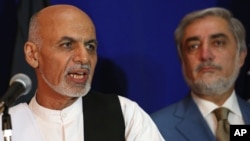Afghanistan's rival presidential candidates pledged to NATO leaders on Thursday that they would form a government of national unity and sign legal agreements allowing foreign troops to stay on next year.
The message to a NATO summit from Ashraf Ghani and Abdullah Abdullah was meant to reassure allies concerned that a lengthy deadlock over the disputed presidential election could force NATO to pull all its troops out of Afghanistan this year.
The rival politicians said they were fully committed to signing two agreements on the status of foreign forces that would NATO to stay on and train and advise the Afghan army after its combat operations end in December.
“We believe in an inclusive political vision. We will form a government of national unity and will honor the participation of our people in the election process,” the candidates said in a message read out in Kabul by Abdullah aide Mahmoud Saiqal.
Talks on a power-sharing deal between Ghani, winner of the election according to an initial count, and Abdullah collapsed this week, rekindling fears of ethnic unrest over an election marred by allegations of fraud.
Days earlier, Abdullah's team walked out of a U.N. audit of votes from a June 14 run-off ballot, saying it was dissatisfied with the way fraudulent votes were being handled.
The political turmoil created the worst possible backdrop for a summit that heralded the end of more than a decade of inconclusive NATO combat operations against Taliban militants.
NATO had hoped that a new president would be installed in time for the summit, enabling it to celebrate Afghanistan's first democratic transfer of power by inviting the new leader to share the spotlight with U.S. President Barack Obama.
But the deadlock over the election result meant the defense minister had to come instead.
The United States intervened in Afghanistan to deny al-Qaida a sanctuary after the September 11, 2001, attacks. NATO took a peacekeeping role in Kabul in 2003, gradually extending it throughout the country.
Over the past 13 years, at least 16,000 civilians, nearly 3,500 foreign troops and thousands of Afghan soldiers and police have been killed.
Despite NATO's costly effort in lives and cash, civilian casualties have risen sharply this year and Taliban insurgents continue to pose a serious threat to Afghan security forces who have taken over lead responsibility for security operations.
The NATO-led International Security Assistance Force, which now commands some 44,000 troops from 48 nations, is due to be replaced with smaller training mission from next year numbering some 12,000 people.
Outgoing President Hamid Karzai refused to sign the status of forces agreements and NATO diplomats say that they will have decide on a complete withdrawal within a month unless a new president is installed by then and signs the documents.
At the summit, NATO allies renewed their commitment to support Afghan forces financially until the end of 2017. Afghanistan is highly dependent on foreign donors to pay for the huge army and police force, now numbering 350,000 people.





